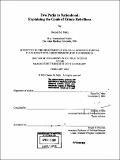Two paths to nationhood : explaining the goals of ethnic rebellions
Author(s)
Metz, Daniel M., 1972-
DownloadFull printable version (15.92Mb)
Alternative title
2 paths to nationhood : explaining the goals of ethnic rebellions
Other Contributors
Massachusetts Institute of Technology. Dept. of Political Science.
Advisor
Melissa Nobles.
Terms of use
Metadata
Show full item recordAbstract
Contrary to widely held assumptions in the ethnic conflict literature, ethnic rebellions do not have to be separatist. Indeed, roughly one third of the largest ethnic rebellions since World War II have been attempts to take over, rather than separate from, existing states. Incorporating theories of nationalism and collective action, this dissertation offers an explanation for why ethnic rebellions take on different goals. The theory posits that popular grievances against the state concerning the legitimate relationship between the ethnic group and the government are crucial for understanding the objectives rebel groups seek. These grievances are shaped by cultural and historic differences between the ethnic group and the ruling group, and affect the goals of rebel movements in part by constraining elites who would organize popular support for rebellion. The dissertation introduces a new dataset of 88 cases of large-scale ethnic rebellions since World War II. Using this dataset, the theory is tested against an alternative view that rebel group goals are determined primarily by opportunity. The analysis finds that opportunity explanations are not sufficient, and that a better explanation incorporates the ideas of group grievances the dissertation introduces. Specific mechanisms whereby cultural and historic differences affect group goals are illustrated through case studies of separatist and state capture ethnic rebellions in Ethiopia. The dissertation makes several unique contributions to both the academic literature and to policy debates surrounding ethnic civil wars. (cont.) Offering the first of its kind dataset of ethnic rebellions categorized by goals, and clearly distinguishing between different types of rebellions, the dissertation adds conceptual clarity to a literature that is often muddied by ambiguous categories, and advances the study of ethnic civil war by suggesting that different types of conflicts are triggered by different factors. Arguing against one-size-fits-all solutions, the dissertation also shows how conflict mitigation strategies will be more effective the more they are tailored to the specific political objectives advanced by rebel groups.
Description
Thesis (Ph. D.)--Massachusetts Institute of Technology, Dept. of Political Science, February 2005. Includes bibliographical references (leaves 218-241).
Date issued
2005Department
Massachusetts Institute of Technology. Department of Political SciencePublisher
Massachusetts Institute of Technology
Keywords
Political Science.